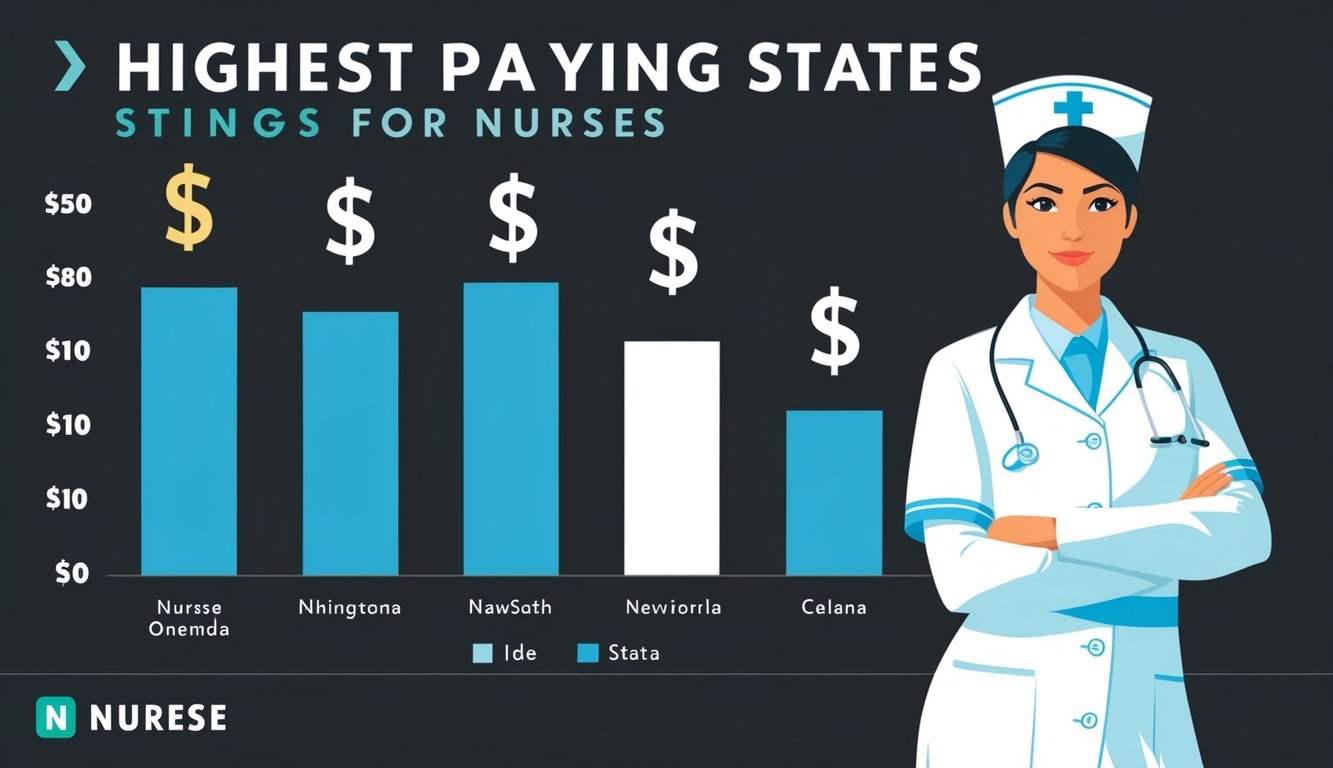Choosing where to begin your nursing career or relocate can significantly impact your earning potential.
The highest paying states for nurses typically offer salaries that can exceed $100,000 annually, with California, Hawaii, and Oregon leading the pack.
In addition to salary, factors like cost of living and job demand also influence your overall financial well-being as a nurse.
As you explore opportunities, you’ll discover that certain states not only offer desirable wages but also foster professional growth and job satisfaction.
By understanding the compensation landscape, you can make an informed decision that aligns with your financial goals and career aspirations.
For data-driven insights, consider reviewing the statistics available through NurseJournal and the U.S. Bureau of Labor Statistics.
Overview of Nursing Salaries in the U.S.
Nursing salaries in the U.S. vary widely based on several factors, including geographical location, experience, and specialty.
Understanding these aspects can help you navigate your career path effectively.
Factors Influencing Nurse Salaries
Several factors significantly impact the salaries of registered nurses (RNs) and nurse practitioners (NPs).
First and foremost is geographical location.
States like California and New York consistently report higher average salaries due to the cost of living and demand for healthcare services.
Experience also plays a critical role.
Entry-level nurses typically earn less than seasoned professionals.
According to the U.S. Bureau of Labor Statistics, the national average salary for RNs is approximately $77,600, but this can vary based on these influencing factors.
Other factors include:
- Specialization: Certain specialties, like anesthesia or midwifery, tend to offer higher salaries.
- Education: Nurses with advanced degrees often earn more.
- Work Setting: Hospitals may pay more than outpatient clinics or nursing homes.
Comparing RN and Nurse Practitioner Salaries
The salary gap between registered nurses and nurse practitioners is notable.
RNs typically earn an average salary of around $77,600, while NPs often have salaries that can exceed $115,000 annually.
This difference is largely due to the advanced training and responsibilities associated with being an NP.
Salaries for RNs and NPs can be broken down as follows:
| Profession | Average Salary |
|---|---|
| Registered Nurse | Approximately $77,600 |
| Nurse Practitioner | Over $115,000 |
Nurse practitioners often enjoy benefits such as increased job opportunities and the ability to work independently, further justifying the investment in their education.
Top-Paying States for Registered Nurses
Registered nurses (RNs) can significantly benefit from understanding which states offer the highest salaries.
This information helps you make informed decisions regarding your career and relocation options.
Below is a detailed analysis of top-paying states and considerations around cost-of-living adjustments.
State by State Analysis
The salary for registered nurses varies by state due to factors such as demand, healthcare funding, and cost of living.
Here are some of the highest-paying states:
| Rank | State | Average RN Salary | Average Hourly Wage |
|---|---|---|---|
| 1 | California | $133,990 | $64.38 |
| 2 | Hawaii | $129,210 | $62.06 |
| 3 | Oregon | $110,940 | $53.16 |
| 4 | Massachusetts | $106,170 | $51.05 |
| 5 | Alaska | $102,770 | $49.38 |
California consistently ranks at the top with its substantial nurse salary, driven by high demand and cost of living.
For detailed salary data, explore the analysis provided by NurseJournal.
Cost of Living Adjustments
It’s essential to also consider the cost of living when assessing nurse salaries.
A high salary may not equate to greater purchasing power if the cost of living is equally high.
For instance, while California offers competitive salaries, it also has a higher cost of living index.
Thus, your earnings might not stretch as far as they would in a state with lower living costs, like South Dakota, where RNs earn an average of $60,540.
Cost-of-living adjustments provide a clearer picture of your actual earnings.
Websites like Incredible Health can help you compare salaries adjusted for living expenses, ensuring your financial decisions are well informed.
Specialized Nursing Roles and Salaries
Specialized nursing roles offer higher salaries compared to general nursing positions, reflecting advanced skills and education.
Two prominent specialties are Certified Registered Nurse Anesthetist (CRNA) and Certified Nurse Midwife (CNM), both of which play crucial roles in patient care and require advanced degrees.
Certified Registered Nurse Anesthetist
A Certified Registered Nurse Anesthetist (CRNA) administers anesthesia and manages patient care before, during, and after surgical procedures.
To become a CRNA, you typically need a Master of Science in Nursing (MSN) and national certification.
Salary Insights
The salary range for CRNAs is significant, often exceeding $205,000 annually, depending on location and experience.
States like Oregon offer some of the highest salaries in the country.
| State | Average Annual Salary |
|---|---|
| Oregon | $236,540 |
| California | $205,360 |
| New York | $188,000 |
This role not only demands expertise but also provides considerable financial rewards making it a sought-after career in nursing.
Certified Nurse Midwife
A Certified Nurse Midwife (CNM) provides comprehensive care to women throughout their life cycle, including prenatal, delivery, and postnatal care.
This role requires a Master of Science in Nursing and certification.
Salary Overview
CNMs earn competitive salaries, often ranging between $112,000 and $130,000 annually.
Factors such as location and healthcare setting can impact earnings.
| State | Average Annual Salary |
|---|---|
| Massachusetts | $130,000 |
| Connecticut | $125,000 |
| Florida | $112,000 |
With a focus on women’s health, CNMs play a vital role in patient care, offering personalized and holistic approaches to healthcare.
Impact of Educational Advancement on Nursing Salaries

Advancing your education in nursing can significantly influence your salary potential.
As you pursue higher degrees and specialized certifications, you position yourself for increased earnings and greater job opportunities.
The following sections address how advanced degrees and online RN to BSN programs can impact your financial prospects.
Advanced Degrees and Certifications
Holding an advanced degree such as a Master’s in Nursing (MSN) or a Doctor of Nursing Practice (DNP) can elevate your career and salary.
RNs with an MSN often see an increase in their average salary, which can reach $100,000 or more, depending on specialization and state.
Certifications in areas such as Nurse Practitioner (NP) or Clinical Nurse Specialist (CNS) further enhance your employability and pay scale.
Many employers prefer or require advanced certifications, making them essential for competitive positions.
In a survey by the American Association of Colleges of Nursing, most facilities reported they value nurses with advanced education, which can lead to roles that command higher salaries.
Investing in these educational advancements can yield significant financial returns.
Online RN to BSN Programs
Online RN to BSN programs provide a flexible pathway for RNs to enhance their education while continuing to work.
Many programs are designed to cater to your schedule, allowing you to balance your studies and job responsibilities effectively.
Graduates from these programs often see salary increases.
Research indicates that RNs with a BSN can earn an average salary of around $78,000, which is notably higher than those with an associate degree.
Additionally, many healthcare facilities are prioritizing the hiring of RNs with a BSN to meet accreditation requirements and improve patient outcomes.
This shift emphasizes the importance of having a BSN, making these online programs a strategic choice for career advancement.
The combination of flexible learning and improved salary potential makes online RN to BSN programs an attractive option for those looking to advance in their nursing careers.
Employment Sectors and Nursing Compensation
The employment sector significantly impacts nursing compensation.
Understanding where nurses are employed can help you identify potential salary variations tied to specific settings and geographic locations.
General Medical and Surgical Hospitals
General medical and surgical hospitals are primary employment venues for registered nurses.
In these settings, RNs often earn competitive salaries due to the high demand for various services.
Average Salaries:
- The average RN salary in hospitals can vary by state. For instance, in states like California, nurses can earn an average of $120,560 annually, while those in Texas may earn around $75,000.
Factors influencing compensation include:
- Workload
- Shift differentials
- Specializations (e.g., emergency care, surgical nursing)
These hospitals typically provide more robust benefits, including health insurance and retirement plans, adding value to the overall compensation package.
Metropolitan vs. Non-Metropolitan Areas
Compensation for nurses can differ markedly between metropolitan and non-metropolitan areas.
Generally, metropolitan areas offer higher salaries.
This reflects the higher cost of living and demand for healthcare services.
Comparison of RN Salaries:
| Area Type | Average Salary |
|---|---|
| Metropolitan | $95,000 |
| Non-Metropolitan | $75,000 |
In metropolitan regions, RNs often benefit from diverse job opportunities, advanced healthcare technologies, and specialized practices.
Conversely, non-metropolitan areas might offer lower salaries.
But they can provide unique opportunities for community health involvement and lower living costs.
Awareness of these differences can guide your career choices.
It can also help in negotiating salaries effectively.
For more detailed statistics, you can explore nursing salaries by state.

